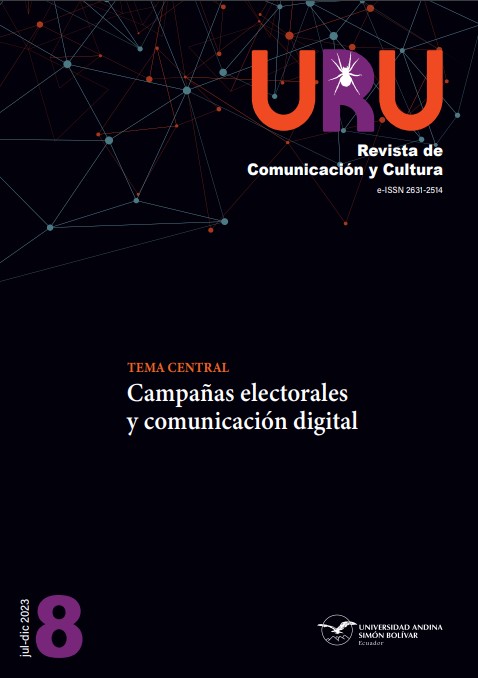Politics and social networks: The meaning of nonsense
DOI:
https://doi.org/10.32719/26312514.2023.8.1Keywords:
Politics, communication, social networks, electoral campaignsAbstract
This work intends to problematize two disciplines of the social sciences such as politics and communication, showing -as a hypothesis- how, paradoxically, social networks, instead of generating a public sphere that strengthens democracy, dilute their forms and trivialize their contents. Since the last general elections of 2021, this story in Ecuador has been expressed on a national and local scale, emptying both political campaigns and the exercise of popularly elected positions of content. However, it is precisely this hollowing out that is giving a new meaning to politics and communication. Are social networks mirages that shield politicians from their specific responsibilities, endorsing citizens to manage the problems of an underlying reality? That is the question that will guide this work. To try to give an answer, we will approach this problem through a dialogue between sociology and political communication, taking the contributions of Bauman and Donskis on liquid modernity, as well as Jaime Durán Barba and Santiago Nieto regarding of the role of virtuality in the reconfiguration of politics, which -in our opinion- shed important light on the current state of affairs. We hope that this document contributes to generating a long-term reflection in the search for the meaning of the apparent “nonsense” that social networks such as Facebook, WhatsApp, Instagram or Tik Tok are printing on politics and communication.
Downloads
References
Bauman, Zygmunt, y Leonidas Donskis. 2019. Maldad líquida: Vivir sin alternativas. Madrid: Paidós.
CIESS. 2022. http://www.ciees.com.ec/noticias.html
Click Report. 2022. “¿Ecuador tiene salida?”. Ecuador Chequea. Abril. https://bit.ly/42bQAoP.
Del Alcázar, Juan. 2022. “Ecuador estado digital abr/22”. Mentinno. Abril. https://bit.ly/3L1LDrx.
Durán Barba, Jaime, y Santiago Nieto. 2018. La política en el siglo XXI: Arte, mito o ciencia. Buenos Aires: Debate
El Universo. 2022. “PSC repite la fórmula en Guayaquil: Cynthia Viteri va por la reelección a la Alcaldía”. El Universo. 25 de mayo. https://bit.ly/41UUEt8.
Estrategia Consultores. 2022. Estudio nacional de opinión pública: A un año del “Gobierno del Encuentro”. Quito: Estrategia Consultores.
Expreso. 2022. “‘Vístanse como les dé la gana’, el ‘trend’ de Cynthia Viteri en TikTok”. Expreso. 10 de marzo. https://bit.ly/3V0dHA6.
Moncagatta, Paolo, Arturo Moscoso, Simón Pachano, J. Daniel Montalvo y Elizabeth Zechmeister, eds. 2020. Cultura política de la democracia del Ecuador y en las Américas, 2018/19: Tomándole el pulso a la democracia. Nashville, US: LAPOP. https://bit.ly/40tEndK.
Moscoso, Arturo, Paolo Moncagatta, Juan Carlos Donoso, Sebastián Larrea y J. Daniel Montalvo, eds. 2021. Cultura política de la democracia en Ecuador y en las Américas 2021: Tomándole el pulso a la democracia. Nashville, US: LAPOP. https://bit.ly/3V3r6rc.
Pachano, Simón. 2021. “La opinión ciudadana en un contexto de cambio”. En Cultura política de la democracia en Ecuador y en las Américas 2021: Tomándole el pulso a la democracia, editado por Arturo Moscoso, Paolo Moncagatta, Juan Carlos Donoso, Sebastián Larrea y J. Daniel Montalvo, 2-13. Nashville, US: LAPOP. https://bit.ly/3V3r6rc.
Perfiles de Opinión. 2022. https://twitter.com/perfilesopinion?lang=es.
Ruiz, Jerson, y Vicente Tagle. 2021. “Lasso: ‘Los zapatos rojos fueron un golasso’”. Extra. 15 de abril. https://bit.ly/40BZx9u.
Telesur TV. 2022. “Desaprobación de pdte. ecuatoriano sube hasta el 70 %”. Telesur TV. 5 de mayo. https://bit.ly/3AmWKqf.
Terán, Nessa. 2022. “De señora a bichota: La transformación de Cynthia Viteri”. GK. 8 de diciembre. https://bit.ly/3HewCBE.
Zechmeister, Elizabeth, y Noam Lupu, eds. 2019. El pulso de la democracia. Nashville, US: LAPOP. https://bit.ly/3AveiAd. La ruta digital en el Gobierno de Guillermo Lasso: Un análisis a partir de las redes sociales y las estrategias de comunicación
Downloads
Published
How to Cite
Issue
Section
License
Copyright (c) 2023 URU, Revista de Comunicación y Cultura

This work is licensed under a Creative Commons Attribution-NonCommercial-ShareAlike 4.0 International License.
ASSIGNMENT OF RIGHTS, DECLARATION OF CONFLICT OF INTEREST AND DISSEMINATION
The authors who publish in this journal accept the following conditions:
- Authors retain copyright and grant the journal the right of first publication, with the work registered under the Creative Commons Attribution-NonCommercial-ShareAlike 4.0 License, which allows sharing, adapting and attributing the work (see: Open Access Policies).
- Authors can make other independent and additional contractual agreements for the distribution of the article published in this journal (e.g., include it in an institutional repository or publish it in a book) as long as they expressly indicate that the article was published for the first time in Uru: Revista de Comunicación y Cultura. In the case of reproduction, a note similar to the following must be included: This text was originally published in the journal Uru: Revista de Comunicación y Cultura N ° -, year of publication.
- Authors are encouraged to publish their work on the Internet (e.g. on institutional or personal pages) in the final version published by Uru: Revista de Comunicaicón y Cultura as it may lead to a wider and faster dissemination of the published work.








